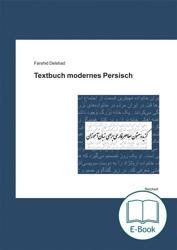The Textbook Modern Persian contains thirty selected readings about contemporary Iran from various disciplinary perspectives. Each chapter of the book includes an introduction to the topic, a rating of the complexity of the text, the philological acquisition of lexical fields within the chapter, and a selected bibliography of additional material on the subject matter. The text also includes a concise Persian-German-English glossary, a conjugation sample, a detailed list of all common infinitives in Modern Persian, and English abstracts for each of the thirty textbook units.
The Textbook Modern Persian contains thirty selected readings about contemporary Iran from various disciplinary perspectives including: literature, philosophy, theology, mysticism, society, politics, history, geography, sports, cuisine, mythology and computational linguistics. Each chapter of the book includes an introduction to the topic, a rating of the complexity of the text (from A2 to C2 according to the Common European Framework of Reference for Languages), the philological acquisition of lexical fields within the chapter, and a selected bibliography of additional material on the subject matter. The text also includes a concise trilingual glossary (Persian-German-English), a conjugation sample, a detailed list of all common infinitives in Modern Persian, and English abstracts for each of the thirty textbook units. This book is ideal for students taking Persian language courses, as well as for anyone interested in contemporary Persian language, literature and culture.
„.Dieses Textbuch eignet sich hervorragend sowohl für Studierende als auch für Interessierte an der zeitgenössischen persischen Sprache, Literatur und Kultur, die ihr diesbezügliches Wissen über den modernen Iran vertiefen wollen“
In:
www.fachbuchkritik.de
Farshid Delshad (born 1972) has a Master of Arts in Iranian and Semitic philology from Iran. He earned his first PhD in Caucasian and Slavic Studies from Tbilisi State University in Georgia. Later, he received a second Masters in "German as a Foreign and Second Language Acquisition" with a minor in "Indo-European Linguistics". He also received a PhD in Historical Comparative Linguistics from the German University of Friedrich-Schiller.
Farshid has been teaching languages and cultures of the Middle East since 1994 in Iran, Georgia, Russia, Germany, France, and Switzerland. His focus includes Contrastive and Historical Linguistics and Minority Research in Islamic countries. He is currently working in Germany and in the United States as an associate scholar for Languages and Cultures of the Muslim World. Farshid is the author of several published chrestomathies and readers in Persian as a Foreign Language.


 Table of Contents
Table of Contents